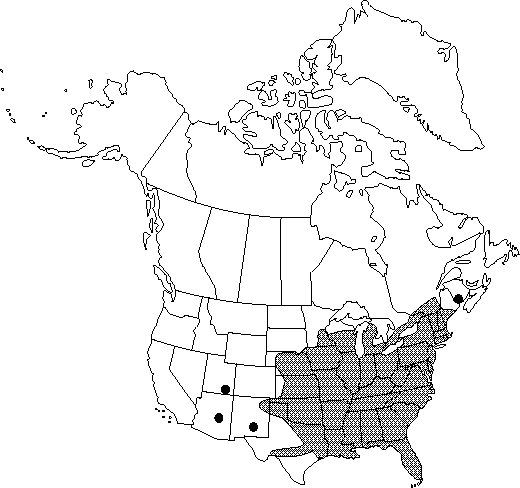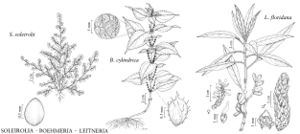Boehmeria cylindrica
Prodr., 34. 1788.
Herbs or subshrubs, 1-16 dm. Leaves opposite or nearly opposite, rarely alternate. Leaf blades elliptic, lanceolate to broadly ovate, 5-18 × 2-10 cm, almost glabrous on both surfaces or abaxially densely short-pilose or puberulent, adaxially scabrous. Inflorescences spikelike, often leafy at apex. Flowers in remote or crowded clusters of 1-few staminate and several pistillate flowers or rarely staminate and pistillate flowers on different plants. Achenes ovoid to nearly orbicular, 0.9-1.6 × 0.9-1.2 mm, almost glabrous or pubescent with straight and hooked hairs; seeds prominent, conspicuous in outline, surrounded except at base by corky tissue. 2n = 28.
Phenology: Flowering summer–fall.
Habitat: Alluvial or moist, deciduous woods, swamps, bogs, marshes, wet meadows, ditches
Elevation: 0-1800 m
Distribution

N.B., Ont., Que., Ala., Ariz., Ark., Conn., Del., D.C., Fla., Ga., Ill., Ind., Iowa, Kans., Ky., La., Maine, Md., Mass., Mich., Minn., Miss., Mo., Nebr., N.H., N.J., N.Mex., N.Y., N.C., Ohio, Okla., Pa., R.I., S.C., S.Dak., Tenn., Tex., Utah, Vt., Va., W.Va., Wis., Mexico, West Indies, Bermuda, Central America, South America (Argentina, s Brazil, Paraguay, Uruguay, and Venezuela).
Discussion
Populations of Boehmeria cylindrica are disjunct in South America.
Plants with thick, often drooping, lanceolate leaf blades, more or less pilose or puberulent abaxially, scabrous adaxially, with short petioles, pilose or puberulent stems, and densely pubescent achenes have been called Boehmeria cylindrica var. drummondiana. These plants are found mostly, but not exclusively, in the southeastern United States and are totally sympatric with more typical plants. The above characteristics may or may not occur together, and each grades into the state found in more typical plants through abundant intermediates. Field and experimental studies are needed to clarify the biologic basis of this variation.
Selected References
None.
